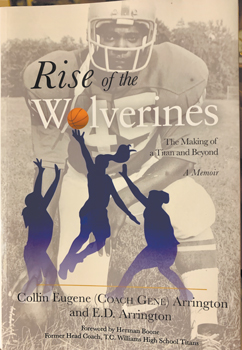 From his high school days playing football for legendary coach Herman Boone to taking the disaster that was the Westover girls’ basketball team and turning it into a state champion, Gene Arrington enjoyed one of the most amazing athletic careers anyone could dream of.
From his high school days playing football for legendary coach Herman Boone to taking the disaster that was the Westover girls’ basketball team and turning it into a state champion, Gene Arrington enjoyed one of the most amazing athletic careers anyone could dream of.
Now, after listening to the urging of friends and family, he’s written a book about his experiences.
“Rise of the Wolverines: The Making of a Titan and Beyond’’ tells Arrington’s story from his days under Boone at T.C. Williams High School in Alexandria, Virginia, to his years turning the Westover girls basketball team into the best in the state.
Arrington’s sister, Ethel Delores Arrington, actually did the writing, as Coach Arrington sat down with her and dictated the story of his life.
“My sister had written a book before and she got right in there with me,’’ Arrington said.
When Arrington took over the Westover girls’ program, then Wolverine principal John Smith said everyone warned him it was a dead-end job and had the record to prove it.
At the time, the Wolverine girls were mired in an 87-game losing streak.
“Westover had been kind of labeled as a nonproductive type of school,’’ Arrington said. “I wanted them to know Westover could do anything any other school could do and win, and they did.’’
Arrington’s formula for success wasn’t anything complicated. “Confidence,’’ he said. “Those girls were confident they could beat anybody.’’
He said his guidance as a coach came largely from the legendary Boone, whose story was featured in the 2000 film “Remember the Titans,’’ starring Denzel Washington, which shared the story of Boone’s 1971 T.C. Williams team and the challenges he faced coaching at the height of public school integration.
“He was my mentor,’’ Arrington said. “He was my buddy. Most of the things I did were a mirror of him.’’
Boone, who died of lung cancer last December, wrote the foreword for Arrington’s book.
Arrington snapped the Westover girls’ losing skid in his first season there with a win over perennial Cumberland County girls’ basketball power Pine Forest.
In his 15 seasons at Westover, Arrington only had three teams with losing records. From 2004-10, his teams won 20 or more games every season, winning or sharing the conference basketball title six times. Health reasons led him to retire before the 2013 season.
The Wolverines had their best season in 2008, when they went 30-2 and defeated West Charlotte 58-53 at N.C. State’s Reynolds Coliseum for the North Carolina High School Athletic Association 4-A girls’ basketball title. Along the way, they knocked off a 30-0 Raleigh Wakefield team in the semifinal round.
In the title game against West Charlotte, Arrington recalled taking a timeout with about five minutes to play and his team trailing by eight points.
Arrington said he usually did the talking during timeouts, but he recalled a moment reminiscent of one of the final scenes in the famed high school basketball movie “Hoosiers.”
Linda Aughburns, one of the stars of the state title team, looked at Arrington in that huddle and said to her coach, “We got this,’’ he recalled.
In January of 2015, Westover paid tribute to Arrington’s outstanding career by naming the gym at the school in his honor.
Arrington said his hope for people who read the book is they will get a simple message from it. “I hope they’ll realize perseverance, building confidence, faith in each other and believing are the keys to success,’’ he said.
The book is not available in stores. For information on purchasing it, go to www.coachgene.net. The cost is $17 plus $5 for shipping and handling. To